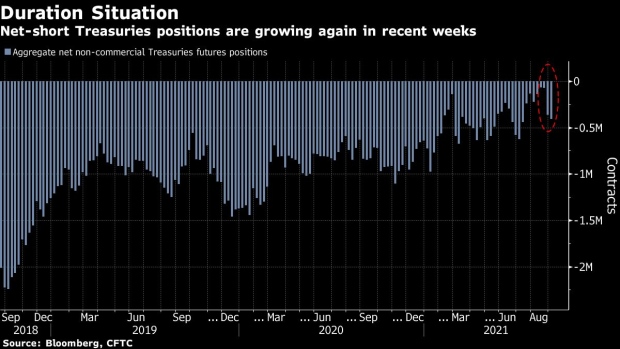Sep 15, 2021
Hedge Funds Are Shorting Bonds Again in Ill-Timed Inflation Bet
, Bloomberg News

(Bloomberg) -- Hedge funds are rebuilding a bet on U.S. inflation that’s backfired in recent months, expecting price pressures to spark a selloff in Treasuries. So far they’ve been disappointed.
Treasury yields ticked lower Tuesday after a report showed the pace of consumer price growth was less than forecast in August. The rate on the 10-year benchmark note has declined 9 basis points in the past week to 1.28% Wednesday -- defying expectations that rebounding growth and inflation are set to push yields higher.
Yet the so-called short duration bet is proving hard for funds to resist, despite recent losses. After shrinking to a four-year low in late-August, an aggregate of net short non-commercial positions across all Treasury maturities has increased for three straight weeks, according to the latest data from the Commodity Futures Trading Commission.
Bad bets on rising interest rates have been toxic for macro hedge funds, with Alphadyne Asset Management one of the biggest casualties of this summer’s short squeeze.
Treasuries should typically sell off in an environment of economic expansion and inflation -- but they have rallied. Since peaking at 1.77% at the end of March, the 10-year Treasury benchmark yield has slid almost half a percentage point.
And so long as the delta virus variant continues to spread and threaten the global recovery, hedge funds that are shorting the bond market may face a wait for payday.
JPMorgan Chase & Co. strategists, at least, are confident that market pricing will soon reflect stronger inflation and growth. They recommended clients hold underweight positions in bonds and “large overweights” in equities, especially stocks of firms tied to the business cycle.
“We believe that markets will look through current growth weakness and that fears about stagflation are rather exaggerated,” according to strategists including Marko Kolanovic in a Sept. 13 note to clients. “We expect the reflation/reopening trade to resume its outperformance.”
©2021 Bloomberg L.P.


